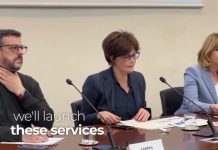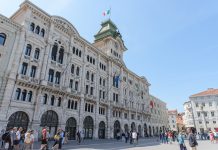by InTrieste
Interview: Interview: FVG governor, Massimiliano Fedriga; FVG councilor for health, Riccardo Riccardi
Friuli Venezia Giulia has introduced a permanent funding mechanism to help municipalities respond to increasingly severe weather events, shifting from one-off emergency measures to a long-term approach to climate resilience.
The initiative allocates €24.5 million to 44 municipalities for projects aimed at mitigating flooding and landslides, reinforcing slopes and waterways, and protecting public infrastructure and inhabited areas. An additional €3.1 million has already been distributed this year for urgent interventions in 29 towns following intense storms in the spring and late summer.
“We have decided to make these measures structural,” said President Massimiliano Fedriga, presenting the program in Trieste. “This allows us to intervene promptly where the most critical situations arise, beyond ordinary circumstances.” He added that the plan will not be the last, calling sustained action essential as extreme weather becomes more frequent.
Civil Protection Councillor Riccardo Riccardi outlined the scale of recent events: 22 official weather alerts in recent months, with heavy rainfall triggering meteorological, hydrogeological, and coastal emergencies. On May 5, more than 200 millimeters of rain fell within 24 hours in the Tramonti area; on September 9, Lignano recorded 181 millimeters in 12 hours.
Emergency crews carried out 102 missions during the most critical periods, deploying 383 volunteers and 123 vehicles.
The new funding will prioritize works to prevent flooding and rockfalls, restore damaged infrastructure, and improve safety in residential zones and along key emergency routes.
Riccardi noted that the region has already managed more than 1,200 climate-related construction sites since the Vaia storm in 2018, with expenditures exceeding €500 million. That effort, he said, has helped the territory withstand increasingly localized and intense weather events.
Officials emphasized cooperation with local administrations and signaled a continued, proactive stance. “We know these events will continue,” Fedriga said. “The only way forward is sustained and coordinated action with our communities.”






























